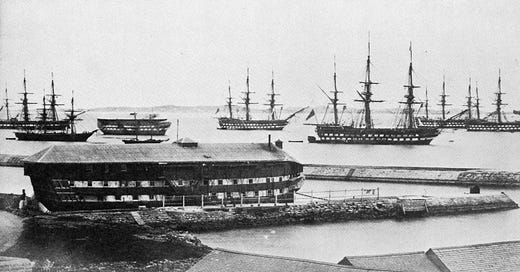An Englishman abroad
From a life on the sea to land-based detective, Lewis Mann had a varied career
Many private detectives moved into the industry after previous careers. Although it was common for former policemen and detectives to change course to private inquiry work -either on retiring or for other reasons - individuals from many different backgrounds and jobs came to private detection later in life. In the case of Edinburgh private detective Lewis Mann, it came after two previous careers: as a naval seaman, and then as a policeman.
Lewis was born on 15 October 1855 in Bermondsey, at least the third generation of Lewis Manns in his family, as his father and grandfather both bore the same name (as would Lewis's own son). His childhood was spent with his father largely absent, for he was a mariner. Therefore, Lewis was brought up largely by his mother, Caroline. Neither of Lewis's parents were from London - his father was from Colchester, Essex, and his mother from Norfolk. However, they had married in Bermondsey in 1849, and it was here that their three children were born.
Lewis joined the Royal Navy in his teens
It is perhaps not surprising, given his father's career at sea, that Lewis grew up to want to be on the sea as well. At 18, he was in the Royal Navy, and he would serve a full decade as a seaman, between 1873 and 1883. On leaving the navy, he decided not to return to London, but instead made a new home for himself in Edinburgh. This was not a new place for him - in fact, Lewis had married a girl from Edinburgh while still serving in the navy. His wife was Ellen (nee McQueen), the daughter of Irish immigrants - her father worked in Edinburgh as a fish dealer. In 1881, they had a son, Lewis Joseph, but by 1891, Lewis was lodging alone in Edinburgh.
19th century Edinburgh
After leaving the navy, Lewis had started a second career as a police constable in the Edinburgh City Police, and was certainly working for the force by 1886. There are a couple of mentions of a 'Constable Mann' in the Edinburgh newspapers of the late 1880s which are probably referring to Lewis. In one, he gave evidence in the prosecution of several young men for gambling - despite Lewis's claims of witnessing suspicious behaviour, money left on a table, and a tablecloth that looked as though it was being used for a gambling table, the case was not proven. In another case, he gave evidence against a pub landlord who was accused of selling ale and whisky to two individuals who were already drunk. Again, this case was not proven.
In 1892, a boiler-maker named Peter Gardner was brought before the Leith Police Court charged with assaulting three policemen. William Jamieson, a constable with the Leith Police, had been trying to help a drunk man when Gardner accosted him. PC Jamieson blew his whistle, and two Edinburgh detectives - Lewis Mann and his colleague Andrew Peebles - came to his assistance. Gardner, on seeing these two men, became very violent and started kicking Jamieson, before starting on the other two. They ended up having to carry him down Leith Walk as the only means of apprehending him, his boots falling off as a result. Suddenly, a crowd started to gather, looking rather menacing.
The policemen took refuge in the stairwell of 223 Leith Walk, but found themselves under threat from the crowd - described as a 'Sunday mob' in the papers - who started throwing stones at them. The stones broke the panels of the door to the stairs, as well as the fanlight above it. Eventually, they decided to proceed to the police office, but on the way, more stones were thrown, with Peebles having a stone hit him in the face, and Mann having one hit him on the head. Several windows were smashed by the stones, with a large window being broken at 209 Leith Walk. Gardner was found guilty of assault and fined £3.
This was all part of a day's work for the police, and it did not result in Lewis leaving the Edinburgh force; in fact, it wasn't even the first assault inflicted on him (in 1889, a labourer had assaulted Mann on Grassmarket one Saturday, and continued to verbally assault him in court). Nine months after the mob assault, he was giving evidence in a Society for the Prevention of Cruelty to Children case. Most of the cases that reached court and needed Mann to give evidence were about the monitoring of people's behaviour: child cruelty, drunkenness and holding shebeens, gambling.
Lewis may have spent up to a decade in the police, but by 1901, he had changed career again. He was still lodging in a house in Edinburgh, but he was now listed as a private inquiry agent. Unfortunately, we know less about this line of work than his police career - for private detectives worked largely under the radar (unless they were actively self-publicising), whereas police officers frequently appeared in court to give evidence in various cases, and so it's easier to track what they were doing and when.
Lewis had lived in Edinburgh for several years by the time he started work as a private detective, and he knew how the law operated, having gained valuable experience of detective techniques in the process. He would also have known many people locally - from the local drinkers and gamblers to other officers who might be able to help him. However, he was still an outsider; presumably, he still had something of a Bermondsey accent - although blunted by his naval travels and his years in Scotland - which would have made him stand out locally. But perhaps that didn't really matter for him.






